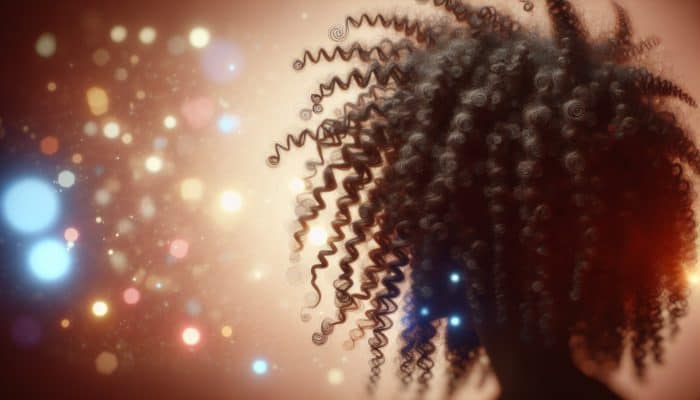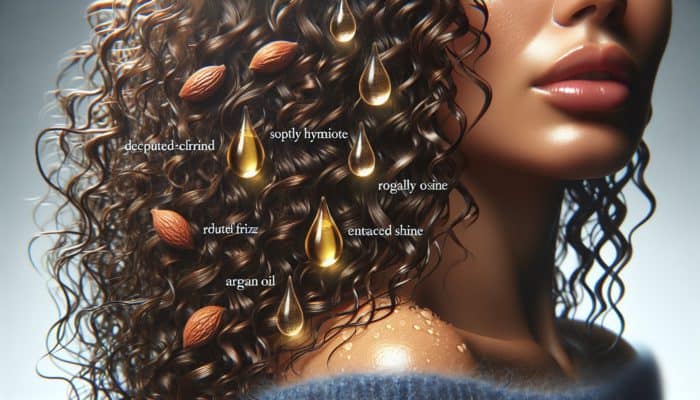Comprehensive Guide to Coily Hair Care
Defining the Characteristics of Coily Hair

How to Treat Coily Hair for Softness: Coily hair is remarkably distinctive, renowned for its intricate structure, characterised by tight curls or spirals that not only create a stunning visual allure but also define the individuality of those who wear it. This unique texture, while beautiful, presents specific challenges that require careful attention, such as a greater tendency towards dryness and frizz if not properly cared for. The tight curl pattern can hinder the natural oils produced by the scalp from traversing down the hair shaft, which often results in strands that feel brittle and coarse. Consequently, achieving the desired softness that is synonymous with healthy hair becomes a challenging task for individuals with coily hair.
Grasping the scientific principles behind coily hair is paramount for effective hair care. The shape of the hair follicle primarily determines the curl pattern; oval-shaped follicles yield curlier strands in contrast to round ones. This unique structure contributes to the overall beauty of coily hair but complicates maintenance routines. Recognising these essential factors is vital for anyone eager to learn how to effectively treat coily hair for softness.
Understanding the Critical Role of Moisture
Moisture serves as the lifeblood for coily hair; without adequate hydration, the strands can quickly spiral into a state of dullness and brittleness. The hydration levels present in coily hair directly affect its elasticity, which is fundamental in preventing breakage and encouraging healthy growth. When coily hair is deprived of moisture, it tends to become brittle, resulting in split ends and hindered growth.
Integrating a comprehensive hydration routine is essential for achieving and maintaining soft, healthy, coily hair. This includes not only the application of hydrating products externally but also ensuring sufficient internal hydration by consuming an adequate amount of water daily. The link between water intake and hair vitality is not merely anecdotal; numerous studies validate that hydration significantly impacts hair texture and overall health. For those seeking to achieve softness in their coily hair, a focus on moisture retention can yield transformative results.
Determining Your Unique Hair Type
Identifying whether your coily hair falls under type 3 or type 4 is crucial as it can significantly shape your hydration routine. Type 3 hair typically features looser curls that still maintain a defined pattern, while type 4 hair is characterised by tighter, more zig-zag curls that are often prone to dryness. Recognising your specific hair type empowers you to tailor your products and techniques to meet your individual needs more effectively.
For example, individuals with type 4 hair may find heavier creams and oils more beneficial in combating dryness, while those with type 3 hair might see better results with lighter gels and custards. Understanding these distinctions is crucial for anyone seeking to treat coily hair for softness. By customising your approach, you not only enhance the texture but also promote overall hair health, leading to a more manageable and vibrant appearance.
Choosing Hydrating Shampoos and Conditioners

Finding the Ideal Shampoo for Coily Hair
Selecting the appropriate shampoo is foundational to a successful hair care regimen, especially for individuals with coily hair. It is advisable to opt for shampoos enriched with hydrating ingredients, such as aloe vera and glycerin, which are known for their ability to cleanse without stripping the hair of its natural oils. Unlike traditional shampoos that may contain harsh sulfates, hydrating shampoos are specifically designed to maintain moisture levels while effectively lifting dirt and product buildup.
The choice of shampoo can significantly influence the success of your entire hair care routine; a well-formulated hydrating shampoo lays the essential groundwork for enhanced softness. For those keen on discovering how to treat coily hair for softness, selecting the right cleansing agent can make a significant difference. Always remember to follow up with a conditioner that complements your shampoo, ensuring a holistic and effective hydration strategy.
The Transformative Benefits of Deep Conditioning
Deep conditioning treatments represent a transformative step in any coily hair care routine. These intensive treatments penetrate deeply into the hair shaft, replenishing lost moisture and revitalising the strands from within. The result is softer, more manageable, coily hair that effectively defies frizz and dryness. Regular deep conditioning can also enhance elasticity, which is crucial for preventing breakage and maintaining hair length.
Utilising a deep conditioner rich in hydrating ingredients, such as shea butter or coconut oil, can significantly improve the texture of coily hair. The frequency of deep conditioning should be adjusted according to your hair's specific needs—those with extremely dry or damaged hair may find that weekly treatments are beneficial, while others might choose bi-weekly applications. By incorporating deep conditioning into your regimen, you can unlock the secrets to treating coily hair for softness, ultimately revealing its full potential for vibrancy and health.
The Essential Role of Leave-In Conditioners

Leave-in conditioners play a critical role in maintaining hydration throughout the day. These lightweight formulas are specifically designed to be applied after washing and can dramatically reduce frizz while enhancing softness. They act as a protective barrier, providing continuous moisture and nourishment to coily hair.
For individuals aiming to maximise hydration, a quality leave-in conditioner can be a game-changer. Look for products that incorporate ingredients such as jojoba oil or argan oil, both celebrated for their remarkable moisturising properties. When combined with an appropriate styling routine, leave-in conditioners can help you achieve that sought-after softness and manageability characteristic of healthy coily hair. Understanding and implementing this aspect of care is crucial to mastering the treatment of coily hair for softness.
Establishing the Importance of Regular Hydration
Consistent hydration through shampoos and conditioners is vital for the overall health of coily hair. Regular use of hydrating products helps to prevent dryness and breakage, promoting a more vibrant appearance. Maintaining regular hydration not only supports moisture retention but also plays a significant role in enhancing the natural shine and softness of the hair.
For optimal results, consider integrating a weekly or bi-weekly treatment focused on rejuvenating hydration. This could involve masks specifically formulated for coily hair or treatments rich in nutrients that work synergistically with your existing regimen. Committing to consistent hydration routines can lead to remarkable improvements in the overall texture and manageability of coily hair, making the journey to discovering how to treat coily hair for softness much smoother.
Effective Moisturising Techniques for Coily Hair
Mastering the L.O.C. Method for Optimal Moisture Retention
The L.O.C. method, which stands for Liquid, Oil, and Cream, is a highly effective technique for locking in moisture in coily hair. This layering method ensures that each product serves its specific purpose, ultimately contributing to softer, more hydrated strands. The first step involves applying a liquid product, such as water or a hydrating spray, to thoroughly saturate the hair. Following this, an oil is applied to seal in the moisture, and finally, a cream is used to provide added definition and hydration.
Utilising the L.O.C. method can yield significant benefits for those looking to enhance their understanding of how to treat coily hair for softness. Each step plays an integral role in ensuring moisture retention while preventing frizz. The effectiveness of this method can vary based on individual hair types, so some experimentation may be necessary to find the ideal combination that works best for you.
Embracing Protective Styling for Healthier Coily Hair
Protective styling is an invaluable approach for maintaining the health of coily hair. Styles such as braids, twists, and updos not only offer aesthetic appeal but also serve practical purposes. These styles protect the ends of the hair, which are often the most vulnerable to damage and dryness. By retaining moisture within the strands, protective styles help keep coily hair soft and healthy.
Incorporating protective styles into your hair care routine can also reduce manipulation, a common cause of breakage in coily hair. Furthermore, styles that tuck away the ends can be worn for extended periods, allowing deep conditioning treatments to work their magic while the hair remains shielded. For anyone eager to learn how to treat coily hair for softness, adopting protective styles can be a wise strategy for achieving and maintaining that desired softness.
The Importance of Regular Moisturising Practices
Regularly applying a lightweight moisturiser can be a transformative practice for coily hair. This daily routine helps combat the natural dryness that often accompanies coily textures. By incorporating a light, hydrating product into your regimen, you can maintain softness throughout the day, reducing frizz and promoting a more defined curl pattern.
It is essential to select the right type of moisturiser—look for those containing hydrating components like aloe vera or glycerin. These ingredients will not only nourish the hair but also help lock in moisture without weighing down the curls. Implementing a daily moisturising routine can be a crucial factor in mastering how to treat coily hair for softness, allowing for a more vibrant, healthy appearance.
Incorporating Deep Conditioning Treatments into Your Routine
Deep conditioning treatments should be a staple in the hair care regimen for coily hair. These intensive treatments penetrate the hair shaft, delivering a powerful boost of moisture that can dramatically transform the hair’s texture. Regular deep conditioning can restore moisture levels, fortify the hair, and enhance its natural softness and manageability.
Selecting the right deep conditioner is crucial; look for products rich in natural oils and butters, such as shea butter or coconut oil, which are renowned for their nourishing properties. The frequency of deep conditioning should be tailored to your hair's needs—depending on its condition, treatments can be performed once a week or even more frequently. By committing to this practice, individuals can unlock the secrets to treating coily hair for softness, resulting in a healthier, more luxurious appearance.
Utilising Natural Oils and Butters for Coily Hair Care
Exploring the Benefits of Coconut Oil
Coconut oil is widely celebrated for its remarkable ability to penetrate the hair shaft, providing intense hydration and reducing protein loss. This unique characteristic makes it especially beneficial for coily hair, which often struggles with moisture retention. Regular application of coconut oil not only hydrates the hair but also contributes to a softer texture, significantly enhancing overall manageability.
Additionally, coconut oil is rich in fatty acids, which can strengthen the hair and prevent breakage. Its antimicrobial properties also make it an excellent choice for maintaining a healthy scalp, thereby promoting hair growth. Those looking to understand how to treat coily hair for softness will find coconut oil an invaluable addition to their hair care arsenal, yielding transformative hydration and nourishment.
Harnessing the Power of Shea Butter
Shea butter is a powerhouse ingredient known for its rich vitamin content and fatty acids that nourish and soften coily hair. This natural emollient is particularly effective in sealing moisture and enhancing shine, making it a popular choice among individuals with coily textures. Its creamy consistency allows for effortless application, ensuring that every strand is coated with hydration.
Utilising shea butter in your hair care routine can lead to remarkable improvements in softness, as it penetrates deeply into the hair shaft while providing a protective barrier against environmental factors. It can also help reduce frizz and enhance curl definition, making it an ideal companion for anyone seeking to master the effective treatment of coily hair for softness.
Exploring Other Effective Oils for Coily Hair
Oils like argan and jojoba also play a significant role in enhancing the softness of coily hair. Argan oil, often dubbed “liquid gold”, is renowned for its high levels of antioxidants and essential fatty acids that nourish and repair damaged locks. Jojoba oil, which closely resembles the natural sebum produced by the scalp, serves as an excellent moisturiser that aids in moisture retention.
Incorporating these oils into your hair care routine can provide additional moisture and nourishment, resulting in improved softness and manageability. By diversifying the oils used, individuals can experiment with various combinations that best suit their unique hair type and needs, making strides in their quest to learn how to treat coily hair for softness.
Discovering the Benefits of Olive Oil
Olive oil is abundant in antioxidants and vitamins, making it an excellent choice for moisturising and repairing damaged curly hair. Its lightweight nature allows it to penetrate the hair shaft effortlessly, providing hydration without leaving a greasy residue. This makes olive oil suitable for daily use, helping to maintain softness and prevent breakage.
In addition to its hydrating benefits, olive oil can also enhance the overall health of coily hair by nurturing the scalp and reducing inflammation. This holistic approach to hair care ensures that individuals focus not only on the strands but also on the health of the scalp. Those aiming to discover how to treat coily hair for softness should consider incorporating olive oil as a staple in their routine for optimal benefits.
Utilising Mango Butter for Enhanced Moisture
Mango butter provides intense hydration and is rich in nutrients that promote healthy, soft, and coily hair. Known for its emollient properties, mango butter helps to seal in moisture while enhancing the hair's natural sheen. Its rich texture makes it ideal for deep conditioning treatments or as a leave-in product to maintain softness throughout the day.
Incorporating mango butter into your hair care regimen can lead to dramatic improvements in the texture of coily hair, making it a fabulous option for those looking to master the art of treating coily hair for softness. With regular application, you may discover not only enhanced softness but also improved overall hair health and vibrancy.
Avoiding Common Pitfalls in Coily Hair Care
Understanding the Risks of Over-Washing
One of the most prevalent mistakes made by individuals with coily hair is over-washing their hair. Frequent washing can strip coily hair of its natural oils, leading to excessive dryness and a lack of softness. The unique structure of coily hair inherently inhibits moisture retention, making it crucial to preserve the natural oils produced by the scalp.
To mitigate this issue, it is advisable to wash coily hair no more than once or twice a week, depending on your lifestyle and the specific needs of your hair. When washing, utilise a gentle, hydrating shampoo that cleanses without removing essential moisture. Understanding the delicate balance between cleanliness and moisture retention is crucial to effectively treating coily hair for softness.
Avoiding the Dangers of Heat Damage
Excessive use of heat styling tools can lead to severe damage to coily hair, rendering it brittle and less soft. High temperatures can strip away moisture and vital nutrients, causing the hair cuticles to lift and become porous. This results in increased frizz and diminished softness, which can be disheartening for those who cherish their coily locks.
To avoid heat damage, consider embracing your natural texture more frequently and limiting the use of heat styling tools. When you do choose to use heat, always apply a high-quality heat protectant to safeguard your strands. Learning to embrace low-heat or heat-free styling options can significantly aid in your pursuit of treating coily hair for softness, allowing your natural beauty to shine through.
Steering Clear of Harsh Chemicals
Harsh chemicals commonly found in many commercial hair products can cause significant damage to coily hair, stripping away moisture and leading to breakage. Ingredients such as sulfates and alcohol should be avoided, as they can disrupt the hair's natural moisture balance.
When selecting products, it is advisable to choose those formulated specifically for coily or curly hair, which are often free from harmful chemicals and enriched with hydrating ingredients. This mindful approach can significantly enhance your understanding of how to treat coily hair for softness, paving the way for a healthier and more manageable hair type.
The Interconnection Between Diet and Hair Hydration
The Critical Importance of Adequate Water Intake
Internal hydration is just as vital as external treatments when it comes to preserving the softness of coily hair. Adequate water consumption plays a fundamental role in overall health, directly impacting hair quality. When the body is well-hydrated, it reflects in the hair, resulting in softer and more resilient strands.
To ensure optimal hydration, aim to consume at least 2 litres of water daily, adjusting according to your activity levels and environmental conditions. By prioritising water intake, individuals can take significant steps towards mastering how to treat coily hair for softness, culminating in healthier and more vibrant locks.
Nutrients Essential for Promoting Hair Health
A diet rich in omega-3 fatty acids and vitamins A, C, and E can significantly enhance the softness and health of coily hair. These essential nutrients work synergistically to nourish hair follicles and improve moisture retention. Incorporating foods such as salmon, avocados, nuts, and leafy greens should be staples in the diet of anyone aiming to improve their hair health.
Incorporating a variety of colourful fruits and vegetables not only provides essential vitamins but also aids in overall bodily hydration. Understanding the vital link between diet and hair quality is crucial for those who wish to learn how to treat coily hair for softness, emphasising the significance of a holistic approach to hair care.
Exploring the Role of Supplements
While a balanced diet is vital, supplements can also play a role in promoting healthy, curly hair. For instance, biotin is often recommended for enhancing hair thickness and strength. Additionally, omega-3 supplements can provide extra hydration benefits, particularly for individuals who may struggle to obtain enough from dietary sources.
Before initiating any supplement regimen, it is prudent to consult with a healthcare professional to ensure it aligns with your health needs. By incorporating beneficial supplements, individuals can further enhance their understanding of how to treat curly hair for softness, paving the way for improved hair health.
Understanding the Impact of Dehydration on Hair Quality
A lack of hydration can lead to dry, brittle, coily hair, significantly increasing the risk of breakage and dullness. When the body is dehydrated, it prioritises essential functions, often compromising hair quality. Recognising this connection underscores the importance of maintaining proper hydration levels for overall hair vitality.
To combat the effects of dehydration, it is essential to incorporate more hydrating foods into your diet, along with increasing your water intake. Recognising the detrimental impact of dehydration on hair can empower individuals to take proactive steps in their hair care journey, especially when striving to learn how to treat coily hair for softness.
Identifying Foods to Avoid for Optimal Hair Health
Consuming processed foods and high sugar intake can have adverse effects on the moisture and overall health of curly hair. These foods can lead to inflammation and poor circulation, both of which can hinder hair growth and vitality. Instead, focus on whole, nutrient-dense foods that support hair health and hydration.
Opt for a diet rich in colourful fruits, vegetables, and lean proteins, which provide the essential vitamins and minerals necessary for thriving, curly hair. By being mindful of dietary choices, individuals can significantly enhance their understanding of how to treat coily hair for softness, fostering a healthier environment for their hair.
Frequently Asked Questions About Coily Hair Care
What are the best products for coily hair?
Hydrating shampoos and conditioners that contain ingredients like aloe vera, glycerin, and natural oils are ideal for coily hair. Look for products specifically formulated for curly or coily textures to ensure optimal results.
How often should I wash my coily hair?
Aim to wash coily hair no more than once or twice a week to prevent stripping natural oils. This helps maintain moisture levels and softness, crucial for the health of coily hair.
Can my diet impact the softness of my coily hair?
Yes, a diet rich in vitamins A, C, E, and omega-3 fatty acids can significantly improve the softness and health of coily hair, supporting its overall vitality and appearance.
How can I effectively reduce frizz in my coily hair?
Utilising leave-in conditioners, oils, and the L.O.C. method can be highly effective in reducing frizz. Additionally, protective hairstyles help retain moisture, promoting softer hair.
Is heat styling detrimental to coily hair?
Excessive heat styling can cause significant damage and dryness to hair. It’s advisable to limit the use of heat tools and always apply a heat protectant when styling to prevent harm.
What exactly is the L.O.C. method?
The L.O.C. method refers to the layering technique involving Liquid, Oil, and Cream. This method effectively locks in moisture and helps maintain softness in coily hair.
Are natural oils beneficial for coily hair?
Absolutely! Oils such as coconut, olive, and jojoba are known for providing deep hydration, reducing frizz, and enhancing softness in coily hair.
How frequently should I deep condition my coily hair?
Deep conditioning should ideally be done weekly or bi-weekly, depending on the specific needs of your hair. This practice restores moisture and improves manageability, contributing to healthier hair.
Can I use regular shampoo on coily hair?
It’s best to avoid regular shampoos containing sulfates. Instead, opt for hydrating shampoos specifically designed for coily or curly hair for the best results.
What types of foods should I avoid for optimal hair health?
Processed foods and high-sugar items can hurt hair health. Focus on whole foods rich in nutrients to support your hair's well-being and hydration.


Orlando Kaelin
December 27, 2025I really appreciate this deep dive into coily hair care! As someone with coily hair, I can definitely relate to the unique challenges you mentioned, particularly when it comes to tackling dryness and frizz. It’s fascinating how the shape of our hair follicles can impact so much—it feels like another reminder of how diverse and intricate our bodies are.